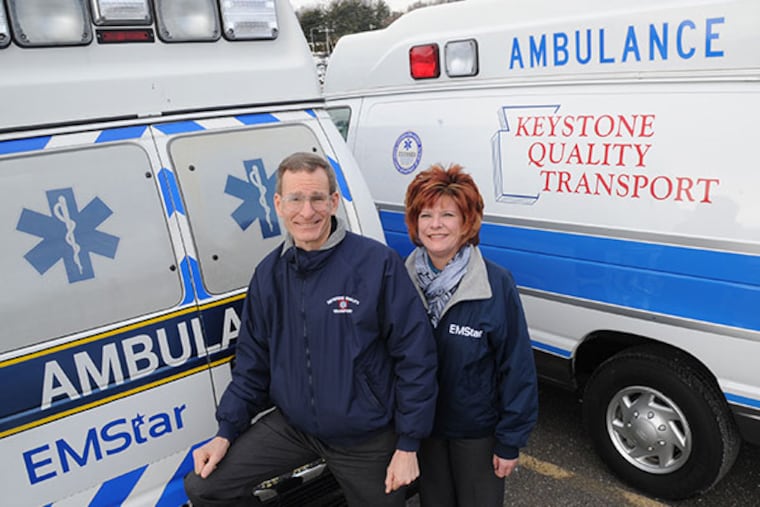Two ambulance companies join forces
Frustrated by a large number of small, fraudulent competitors, two of the largest Philadelphia-area ambulance operators recently joined forces.

Frustrated by a large number of small, fraudulent competitors, two of the largest Philadelphia-area ambulance operators recently joined forces.
"The last couple of years have been really difficult for both companies. It's a very tough market," said Steve Barr, president and chief executive of Keystone Quality Transport Co., which has taken over the management of rival EMStar L.L.C.
Company officials described the deal - which took effect Feb. 9, shortly after federal regulators launched an intensified crackdown on ambulance fraud in the Philadelphia region - as an alliance rather than a merger of the two privately owned medical transportation companies.
The New York-based owners of EMStar, Daniel Herman and Joseph Zupnik, will share in the profits of the joint operations, which are based in Springfield, Delaware County, Barr said. No other terms were disclosed.
The idea behind the alliance was "to take a stand against rampant corruption that we saw in our market," said Todd Strine, whose family owns most of Keystone Quality Transport. Barr, who helped found Keystone in 1994, is also an owner.
Strine said the combined operations would be in a stronger position to survive and be better able to convince health care providers that they would be better off dealing with ambulance companies that follow the rules.
"That noncompliant company might not be there," Strine said.
Under the federal ambulance crackdown, started Jan. 31, Medicare will no longer enroll new ambulance companies in Philadelphia and six surrounding counties in the government insurance program for the elderly.
"It would be the best thing that's happened in at least 15 years to our industry, if the government would rout out the noncompliant providers," Strine said.
In the past, "it was a little bit like playing Whac-a-Mole," Strine said. Every time the government shut down an ambulance company that was fraudulently billing Medicare for unneeded ambulance rides, one or two more would pop up, he said.
In a separate nursing home business, Strine's family had its own run-in with Medicare more than a decade ago.
Strine, 45, became involved in Keystone only after his father, Walter M. Jr., in 2001 was banned from participating in Medicare and other federal health programs for five years because of alleged patient-care violations in long-closed nursing homes.
"The ambulance business, I think, because of what happened to my dad, became extremely focused on compliance, because we had to be," Strine said.
The combined operations employ more than 450 people and operate about 100 ambulances and 150 to 160 paratransit vehicles, Barr said. About 25 jobs in communications, maintenance, and management were eliminated in the consolidation. EMStar had its operations center in Northeast Philadelphia.
Barr said that EMStar provided a strong complement to Keystone's operations.
EMStar is stronger in advanced life support and critical-care transport between hospitals, while Keystone has a much bigger fleet of basic ambulances and paratransit vehicles, Barr said.
"EMStar has a more modern fleet. That helps us as well," Barr said.
Suzanne Shubert worked at EMStar for 14 years before the alliance was formed and is now customer-care manager for both companies.
Asked what she thought when she heard that Keystone and EMStar would join operations, she said: "I was very surprised, and then I was relieved."